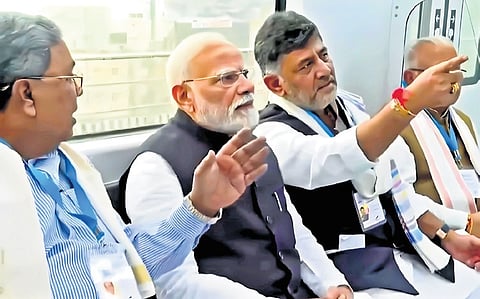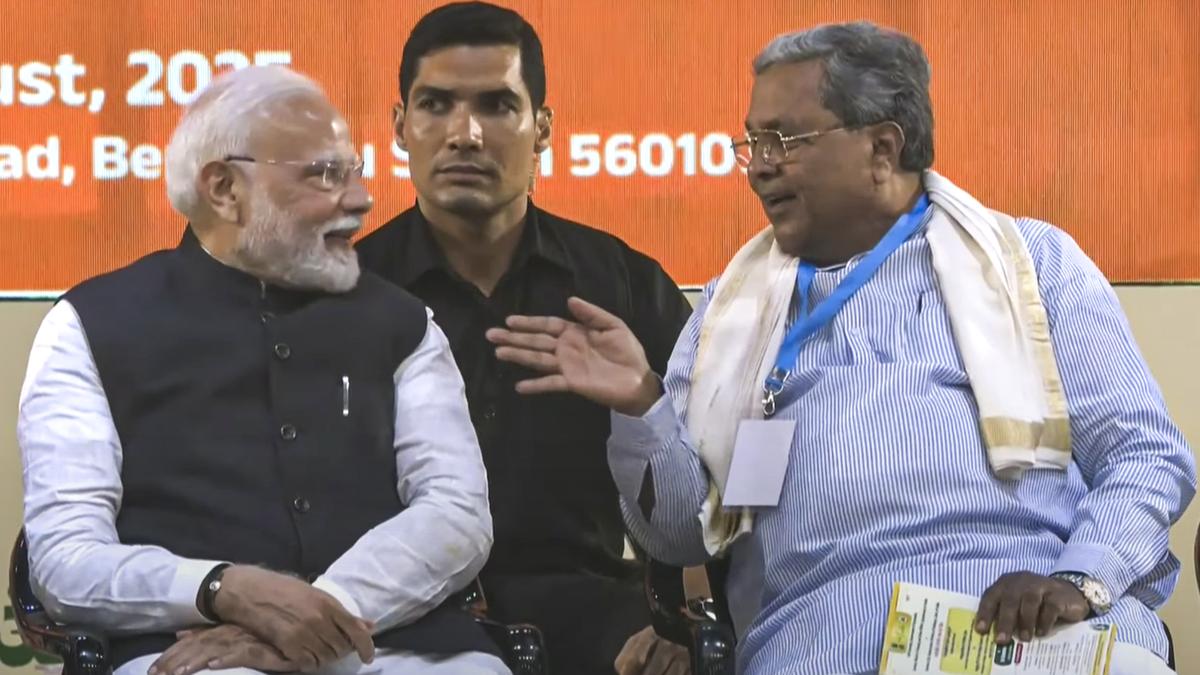In a pointed yet confident statement, Karnataka Chief Minister Siddaramaiah asserted that the state government has invested more in the Namma Metro project than the Union government. Speaking at a public event attended by Prime Minister Narendra Modi, the CM highlighted the scale of Karnataka’s contribution to Bengaluru’s ambitious metro network. His remarks were delivered with an air of pride and political sharpness, subtly emphasizing the state’s commitment to urban infrastructure. The moment, witnessed by a national audience, underscored the ongoing tension between state and central governments over funding and credit for major development projects.
Karnataka Chief Minister Siddaramaiah, speaking at a public event attended by Prime Minister Narendra Modi, asserted that the state government had invested more funds into the Namma Metro project than the Union government. His remarks, delivered with a pointed tone, appeared to challenge the Centre’s narrative of being the primary contributor to Bengaluru’s metro infrastructure. Siddaramaiah emphasized that the state’s financial commitment had been substantial and sustained over the years, suggesting that Karnataka deserved greater recognition for its role in expanding the city’s rapid transit system. The statement drew attention amid the political dynamics of a shared stage with the PM.
Siddaramaiah detailed the financial contributions, stating that Karnataka had allocated a larger share of project funding compared to what was provided by the central authorities. He underscored that this had been the case not just for recent expansions but also for earlier phases of the metro network. According to him, the state government’s proactive approach ensured timely completion of certain stretches and facilitated faster project execution. His speech appeared strategically timed to contrast the state’s performance with the Centre’s involvement, especially in the context of upcoming elections and political credit-sharing over infrastructure development.
The CM’s remarks were delivered during the inauguration of a key Namma Metro stretch, making the statement even more politically charged. Prime Minister Modi, present on stage, listened without immediate rebuttal, maintaining a neutral expression throughout the event. Observers noted that Siddaramaiah’s assertion could be interpreted as an attempt to claim ownership of the metro’s progress in Karnataka’s capital city. The political undertones were clear, as both leaders are part of opposing parties vying for influence and credit ahead of high-stakes electoral battles in the state.
The Namma Metro, one of the largest urban transport projects in India, has been jointly funded by the state and central governments since its inception. While the Union government has played a significant role in policy approvals and partial funding, Siddaramaiah’s claim highlighted a perceived imbalance in financial contributions. Experts say that the financing structure of metro projects often requires heavy state participation, especially for land acquisition and local infrastructure integration, which may explain Karnataka’s higher expenditure figures. His speech brought this often-overlooked aspect into public discussion.

Background
The Namma Metro, officially known as the Bangalore Metro Rail Project, has been one of India’s most significant urban transport initiatives. Launched in 2008, the project was envisioned as a joint venture between the Government of India and the Government of Karnataka. Over the years, disputes over cost-sharing and delays have often made headlines. The state government, led by successive administrations, has claimed to have taken on a heavier financial burden than initially agreed upon. Siddaramaiah’s recent statement is not the first time Karnataka has highlighted this imbalance, but the timing and venue made it particularly impactful.
Stakeholder Views
Political reactions to Siddaramaiah’s remarks were swift and divided. Supporters of the CM praised his assertiveness in claiming due recognition for the state’s contribution, framing it as a defense of Karnataka’s fiscal efforts. Opposition leaders, however, criticized the tone of his statement, accusing him of politicizing a shared infrastructure achievement. Civic activists welcomed the transparency but urged both governments to focus on speedy completion rather than political point-scoring. Commuters, the ultimate stakeholders, expressed mixed feelings—while appreciative of the project’s progress, many still voice frustration over delays and disruptions caused by prolonged construction.
Legal/Political Context
The funding structure for metro rail projects in India is typically split between state and central governments, often on a 50-50 basis, though variations exist. Karnataka’s claim of having spent more than the Union government touches on issues of federal fiscal responsibility and political credit. This tension mirrors broader debates in Indian politics about resource allocation and recognition between states and the Centre. In this case, the optics of Siddaramaiah making his statement in the presence of the Prime Minister adds a sharp political undertone, potentially influencing upcoming electoral narratives in Karnataka.
Environmental Impact
The Namma Metro project, despite its long construction timeline, has been positioned as a sustainable alternative to Bengaluru’s notorious traffic congestion and air pollution. By expanding metro connectivity, the state hopes to reduce dependence on private vehicles, thereby cutting carbon emissions and improving air quality. However, environmental groups have voiced concerns about the destruction of trees, displacement of small businesses, and dust pollution during construction. Both state and central authorities have promised to offset environmental costs through urban greening initiatives, though progress on these commitments remains uneven and often criticized for being too slow.

Current Status
As of now, the Namma Metro network spans over 73 kilometers, with multiple new lines and extensions under construction. The Purple and Green lines are operational, while upcoming corridors aim to link key parts of the city, including the airport. Siddaramaiah’s statement comes at a time when funding requirements for the next phase have reached critical levels. Delays in land acquisition, shifting budget priorities, and disputes over cost-sharing have slowed progress. The state government maintains that its continued investment demonstrates its unwavering commitment to completing the project for the benefit of Bengaluru’s residents.
Expert Opinions
Urban transport specialists have backed Siddaramaiah’s claim that state governments often shoulder more financial responsibility in large infrastructure projects than is commonly perceived. Experts stress that while central funding is vital for technical expertise and policy support, state governments bear the brunt of land acquisition costs, utility relocations, and local coordination. Analysts warn that political disputes over credit can detract from efficient execution. Many advocate for transparent, publicly accessible expenditure records to ensure accountability and to prevent such disagreements from undermining public trust in critical urban development projects like Namma Metro.
Timeline
The Namma Metro project began with its first phase in 2008, aiming to connect east-west and north-south corridors in Bengaluru. The first operational stretch opened in 2011, followed by gradual expansions. Phase 2, approved in 2014, has faced multiple delays due to land acquisition hurdles and cost escalations. The next phase includes ambitious plans to connect the city to Kempegowda International Airport, targeted for completion in the late 2020s. Siddaramaiah’s recent comments come as the project transitions into a critical stage where fresh funding commitments are essential to meet revised deadlines.

Conclusion
Chief Minister Siddaramaiah’s declaration in front of Prime Minister Modi was more than a funding statistic—it was a symbolic assertion of Karnataka’s agency in shaping its urban future. While the political ripples of his statement will continue to be felt, the larger question remains whether state and central authorities can collaborate effectively to deliver on the Namma Metro’s promise. For Bengaluru’s millions of commuters, political credit wars matter less than timely, efficient service. The challenge now lies in turning this moment of pride and tension into renewed momentum for a world-class metro network.
Critics of the CM’s remarks argue that the Centre’s role extends beyond mere funding, encompassing policy facilitation, technology partnerships, and international loan negotiations. They suggest that downplaying these contributions for political gain may distort public understanding of cooperative federalism in infrastructure building. On the other hand, Siddaramaiah’s supporters insist that the Union government often claims disproportionate credit for projects substantially funded by state coffers. The contrasting narratives reveal the complexities of how infrastructure achievements are politically marketed in India.
In his address, Siddaramaiah also reiterated his government’s commitment to expanding the metro network further, citing the necessity of robust urban transport for easing Bengaluru’s traffic congestion. He promised continued state investment in future phases, even if central assistance remained limited. This pledge positioned the Karnataka government as a proactive force willing to take the lead in city development. His statement also appeared aimed at reinforcing local pride and the perception that Karnataka can drive major projects independently if required.
The public reaction to Siddaramaiah’s speech was mixed. While some Bengaluru residents welcomed the acknowledgment of the state’s significant role, others saw it as unnecessary political one-upmanship at an event meant to celebrate infrastructure progress. Social media discussions quickly polarized along party lines, with hashtags praising the CM’s boldness trending alongside accusations of politicizing a public platform. The fact that these remarks were made in the PM’s presence amplified their impact and ensured wide media coverage, setting off debates beyond Karnataka’s borders.
The Prime Minister, for his part, chose not to directly address Siddaramaiah’s remarks during his speech. Instead, Modi focused on the importance of infrastructure for national progress and praised Bengaluru’s role as an economic hub. This avoidance of confrontation may have been strategic, allowing the Centre to sidestep potential controversy during a public inauguration while reserving responses for later political platforms. However, political insiders expect that BJP leaders in Karnataka may counter the CM’s claims in the coming days.
As the Namma Metro continues its expansion, the funding debate could influence public perception of both governments’ contributions. Transparency in expenditure details, including project-specific allocations and timelines, may become a focal point of political discourse. For now, Siddaramaiah’s remarks have reignited the conversation about fiscal responsibility, recognition, and the politics of credit in large-scale infrastructure projects, ensuring that the Namma Metro remains as much a political battleground as it is a transport lifeline for Bengaluru.
Follow: Karnataka Government
Also read: Home | Channel 6 Network – Latest News, Breaking Updates: Politics, Business, Tech & More

